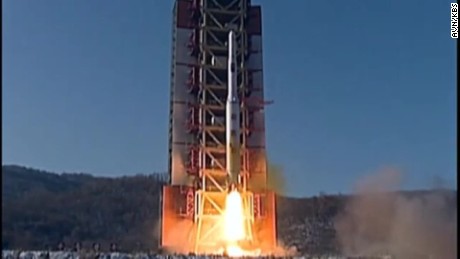United Nations –  The United Nations Security Council voted Wednesday morning to impose a broad array of sanctions against North Korea because of that nation’s recent nuclear test and missile launch — both of which defied current international sanctions.
The United Nations Security Council voted Wednesday morning to impose a broad array of sanctions against North Korea because of that nation’s recent nuclear test and missile launch — both of which defied current international sanctions.
The resolution aims to cripple parts of the North Korean economy that fuel its nuclear and ballistic missile programs. For example, member nations have agreed to inspect all planes and ships carrying North Korean imports and exports and to stop selling aviation fuel to North Korea.
U.S. President Barack Obama immediately praised the action, saying, “Today, the international community, speaking with one voice, has sent Pyongyang a simple message: North Korea must abandon these dangerous programs and choose a better path for its people.”
Samantha Power, U.S. ambassador to the U.N., told the Security Council that North Korea not only treated its population with cruelty, it was the only nation to conduct a nuclear test in the 21st century.
“With each nuclear test and launch using ballistic missile technology, the DPRK improves its capability to carry out a ballistic missile attack not only in the region but a continent away,” she said. “That means having the ability to strike most of the countries sitting on this council. Think about that.”
Power said the sanctions will:
–Require all North Korean planes and ships carrying cargo to be inspected. Previously, nations only inspected planes and ships when they had “reasonable grounds,” which enabled North Korea to hide tools and parts for missiles and the nuclear program in inconspicuous packages, Power said. “This is hugely significant,” she said.
— Ban Pyongyang from exporting most of the country’s natural resources. Coal alone accounted for about $1 billion in annual income, she said.
— Ask U.N. member states to ban North Korea from opening banks, and to close any banks believed to be associated with North Korea’s nuclear and missile programs.
–Direct member states to expel North Korean diplomats and foreign nationals engaged in illicit activities.
–Prohibit nations from providing training to North Korean nationals in fields that could advance the nation’s missile and nuclear programs, such as aerospace engineering and advanced computer simulation.
–Ban member states from allowing North Korea to charter foreign vessels or aircraft, and ban all nations from operating any vessels that use North Korean flags.
–Prohibit the supplying of aviation fuel — including rocket fuel — and the sale of small arms to North Korea.
Defiant bomb test spurred discussions
The United States says these are the toughest sanctions ever imposed by the Security Council — much tougher than those under which North Korea already lives.
Discussions about new sanctions started after North Korea claimed to have successfully tested a hydrogen bomb in January — its fourth nuclear test.
In a signed letter broadcast on state-run media, North Korean leader Kim Jong Un wrote that he wanted to ring in the new year with, quite literally, a bang.
“For the victorious and glorious year of 2016 when the 7th convention of the Workers’ Party will be held, make the world look up to our strong nuclear country and labor party by opening the year with exciting noise of the first hydrogen bomb!” the letter read.
In February, Pyongyang said it had successfully launched an Earth satellite into orbit via the long-range Kwangmyongsong carrier rocket.
South Korea thanks U.S., China
The nuclear test and missile launch outraged the Security Council and worried neighboring nations.
A spokesman for U.N. Secretary-General Ban Ki-moon said following the vote: “This firm response by the Security Council should put an end to the cycle of provocation and lead to the resumption of dialogue in accordance with the unified view of the international community.”
After the vote, the South Korean government issued a statement thanking the United States for initiating the sanctions. Seoul also gave thanks to China “for having engaged in lengthy consultations.”
“A nuclear-armed North Korea will seriously impair the [South Korean] regime, and could induce an arms race in the region, undermining peace and security of the world as a whole,” the said.
Japan’s permanent representative to the U.N., Motohide Yoshikawa, also thanked the United States for taking the lead.
“The DPRK must realize that this message is not only coming from the members of the Security Council but from the international community as a whole,” he said. “Let us be clear. No single country in the world supports the nuclear test nor ballistic missile launch by the DPRK.”
Resolution singles out North Korean individuals, entities
Speaking before the vote, Power stressed that the resolution is not meant to punish the people of North Korea.
“The North Korean people have suffered so much already under one of the most brutal regimes the world has ever known. Rather, this resolution focuses on a ruling elite that have inflicted so much of that suffering,” she said.
A U.S. official familiar with the text said the 22-page resolution lists 17 North Korean individuals and 12 North Korean entities that would be subject to sanctions. The people and companies are believed to be facilitators for North Korea’s weapons programs. Some operate overseas.
The company list includes the aerospace equivalent of NASA in Pyongyang. A major bank in North Korea suspected of conducting many financial transactions for the nation’s military nuclear and missile tests is on the list, too, the official said. The sanctions would reportedly ban more luxury goods going into North Korea.
When asked whether the resolution would make a difference in North Korea’s behavior, the official expressed confidence.
“It will have an impact,” said the official, speaking on the condition of anonymity.
As reported by CNN
